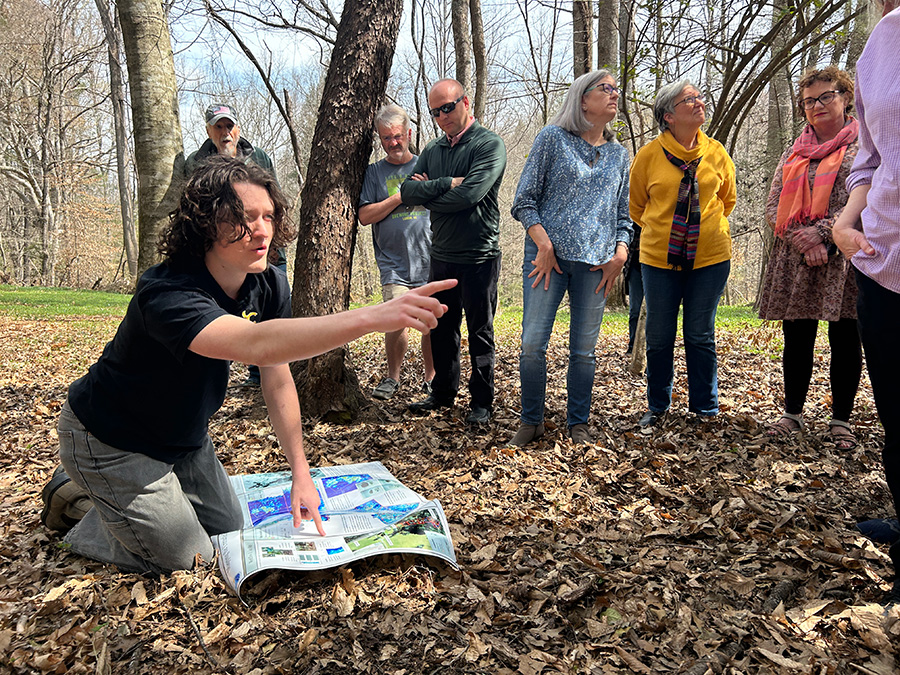
Tucker Terrell ’25, who graduated from App State in May with a bachelor’s degree in geology-environmental geology, far left, shows community members where a single headstone was located by App State researchers trying to determine the position of grave sites in an area formerly covered with brush behind the Fort Defiance site in Caldwell County. Photo by Bret Yager
BOONE, N.C. — In a newly discovered graveyard at Fort Defiance in Caldwell County, an interdisciplinary effort led by Appalachian State University is establishing “a place where science can meet humanity,” as App State researcher Dr. Ellen Cowan describes it. The confirmation of the previously undocumented resting place of enslaved people follows the discovery in 2023–24 of the fort’s buried footprint by the same researchers on a separate project, deepening the history of the Lenoir-area landmark.
Using ground-penetrating radar over several months, Tucker Terrell ’25, of Burlington, a recent graduate of App State’s geology-environmental geology program, confirmed the existence of 105 graves this spring, using multiple scans of a half-acre area previously buried in brush behind the historic home that bears the fort’s name. The subsurface study revealed the graves by bouncing radar waves off their sides and floors to contrast the density of the sites with the untouched soil around them.
Some grave sites could be identified by faint depressions in the ground, visible to those with a trained eye. Researchers also found a single headstone fragment under an old log. Beyond these markers, there was little surface detail to guide the search.
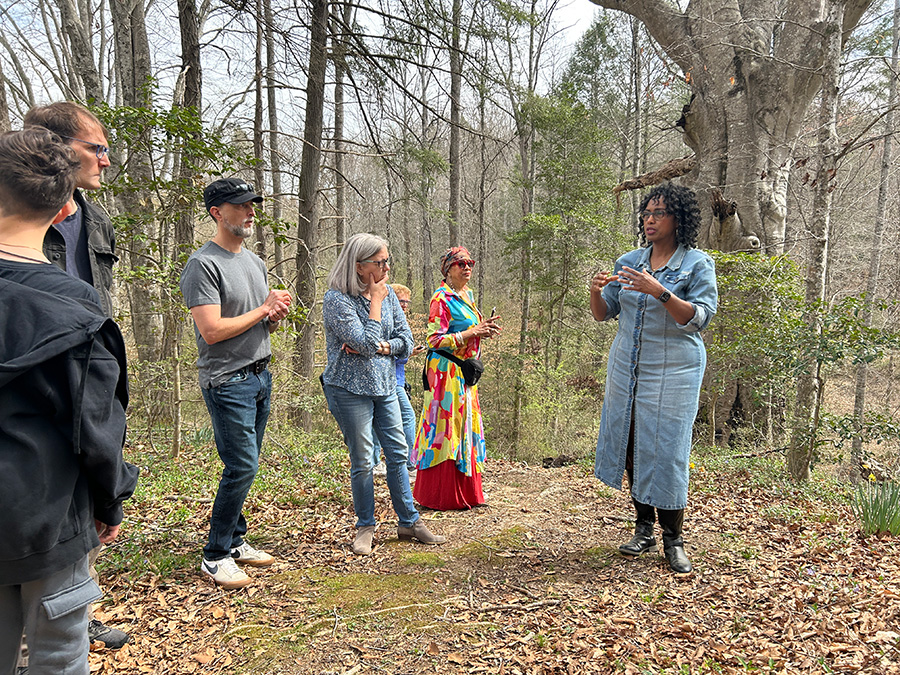
Standing in an unmarked cemetery that likely holds her ancestors, Dr. Leslie McKesson ’93 ’09 ’16, a descendant of the enslaved at Fort Defiance and an affiliate faculty member in App State’s Honors College, explains recent discoveries at the historical site during the unveiling of research and an art exhibit at the fort in late March. Photo by Bret Yager
The discovery highlights the role of the enslaved in the fort’s history and their contributions to the plantation established by Revolutionary War figure Gen. William Lenoir in 1792. It also confirms generations of family stories and holds deep significance for their descendants.
William LeNoir, who today bears the name of the original plantation owner but with a slightly different spelling, had four generations of ancestors enslaved at Fort Defiance. As he walked the cemetery on a recent Saturday afternoon, his gaze fell on a giant beech tree carved with faint initials and other traces of vanished histories. The massive trunk, descendants have said, seems to anchor the area in the manner of a witness tree, and there is something in its size, age and strength that is reassuring.
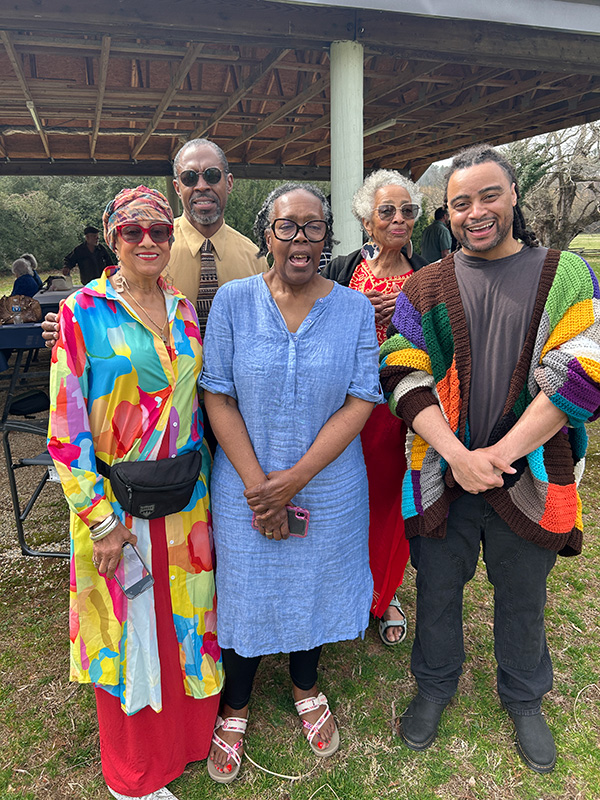
For descendants of those enslaved at Fort Defiance in Caldwell County, the research work at the fort represents important steps toward acknowledging the roles in plantation life of people who were not free. Pictured, from left to right, are descendants Octavia Caldwell, William LeNoir, Rosalind Lenoir-Zachary, Gwen Cradle and Israel Solomon. Photo by Bret Yager
“Whenever I come up, I feel like I’m drawn to come look at the tree and see how it’s doing,” LeNoir said.
The work of discovering and quantifying the graves and attaching them to ancestral story “brings about some reflection,” he said.
“It connects the dots for me,” LeNoir said. “It gives me a reference for where a portion of my history started. It grounds you to know you had family who were an integral part of helping make Fort Defiance what it was. I think of them as the hidden faces of Fort Defiance.”
Revealing something of these faces has been detective work involving local historians, descendants and interdisciplinary researchers at App State led by Cowan, a professor in the Department of Geological and Environmental Sciences (GES).
Central to the effort is Dr. Leslie McKesson ’93 ’09 ’16, a descendant of the enslaved who is an affiliate faculty member in App State’s Honors College. Her study of historic Lenoir family papers gave credence to rumors that a cemetery for the enslaved existed somewhere on the property — including a decades-old report from one descendant that he had stumbled across what looked like a grave in the forest. Ike Forester, the fourth great-grandson of William Lenoir, has done extensive work summarizing history related to enslaved people at the fort, and that documentation became the starting point for the search, McKesson said.
“The story that is here at Fort Defiance is unique because of the amount of information that we have about enslaved people and because of the fact that we can tell a fuller story,” McKesson said. “What happened with the Revolutionary War, what happened here on Fort Defiance property, would not have happened without the labor of a lot of people who were not free. So it’s a broader story, and it’s beginning to get a broader audience.”
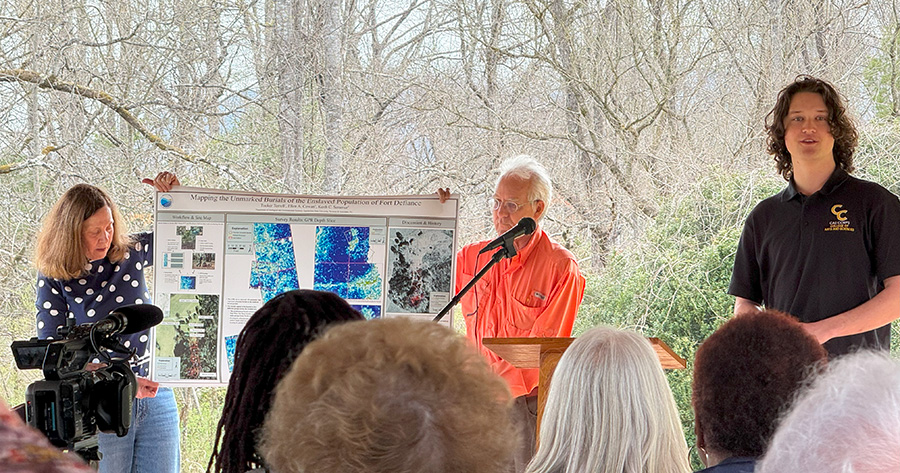
App State alumnus Tucker Terrell ’25, who graduated from App State in May with a bachelor’s degree in geology-environmental geology, right, explains to a group how he used ground-penetrating radar to locate more than 100 graves of enslaved people at Fort Defiance in Caldwell County. Holding the poster displaying Terrell’s findings are project leader Dr. Ellen Cowan, professor in the Department of Geological and Environmental Sciences (GES), far left, and Keith Seramur, adjunct research and teaching professor in the GES department. Photo by Mary Beth McKee
Science beneath the surface
To show what’s under the sod without disturbing the ground, Terrell wrangled massive datasets.
“With a project like this, we have to collect gridded data,” he explained. “So we run lines from south to north to hit burials laid east to west — hopefully multiple times — and there is 1 foot of space between each of our lines. Then we use software to make those cross sections into animation that will show a reflection map of the entire subsurface in 3D.”
Finding and interpreting changes in the density of the ground is far more subtle than work surrounding other burials, which may have a coffin or other hard material to serve as a target for the radar.
“There’s no casket and no biological material left here,” said Terrell.
The data, gleaned from a radar machine that had to be pushed like a lawnmower, forms the basis of Terrell’s senior honors thesis. He worked closely with Cowan and Keith Seramur, an adjunct research and teaching professor in the GES department who owns a geological consulting company and provided equipment and expertise. The work and mentorship gave Terrell research experience that would be tough to gain elsewhere as an undergraduate.
“This is a master’s thesis or Ph.D.-level project I get to work on here,” he said. “The Department of Geological and Environmental Sciences focuses on undergraduate education, which is really special.”
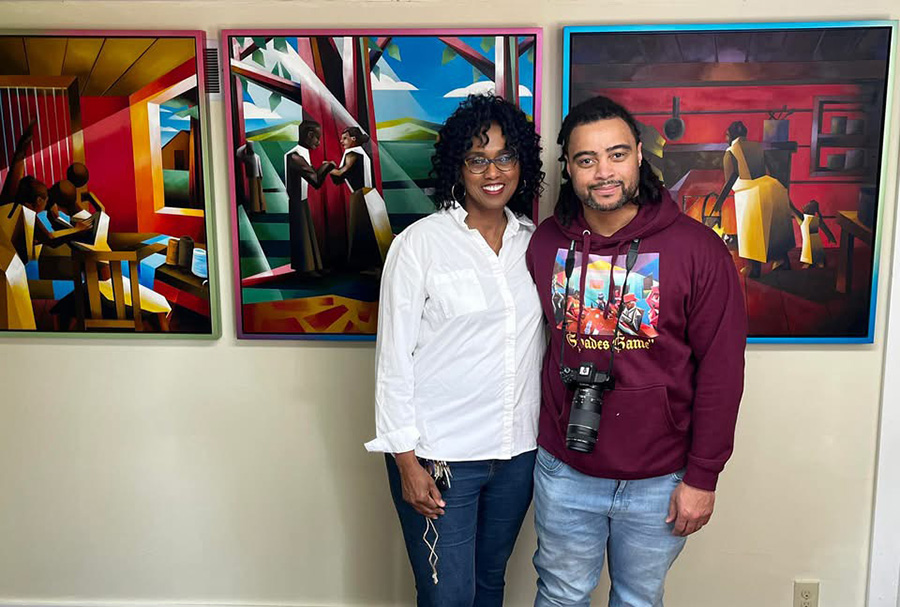
App State affiliate faculty member Dr. Leslie McKesson ’93 ’09 ’16, left, and Indianapolis-based artist Israel Solomon stand in front of his art exhibit honoring the role of enslaved people at Fort Defiance, the Lenoir-area historical plantation site founded by American Revolutionary War figure Gen. William Lenior. The mural series was unveiled March 29 in the summer kitchen at Fort Defiance. Photo by Mary Beth McKee
A cross-disciplinary, collaborative effort
Many hands are helping reveal and celebrate the hidden history of Fort Defiance, whose original structure was built to defend against Native Americans well before Lenoir acquired the land. Eagle Scouts and student volunteers pitched in to clear brush so surveys could be done, and the fort’s board of directors, staff and volunteers have supported efforts and provided space for an art exhibit revealed to the public in late March. During an emotional unveiling of the mural, Israel Solomon, an Indianapolis-based artist who is descended from the enslaved at the fort, imagined a world of imagery and color where his ancestors moved.
“As an artist, I want to work on projects that are meaningful and can stand the test of time,” he reflected. “Definitely, there is a lot of love that lies throughout the work.”
The artistry, historical detective work and supporting efforts help close a circle in a way that the fort’s governing board finds important to its mission.
“We come together to share the other side of the story of Fort Defiance, to pay respect and honor those other faces that lived and worked here,” said Sandra Watts, president of the board, as the mural was unveiled in the fort’s summer kitchen. “It’s our responsibility to educate people about the country’s history so it’s not forgotten or repeated.”
The broad framework of the effort involves collaboration across university departments — an approach that has become central to many of the research missions at App State.
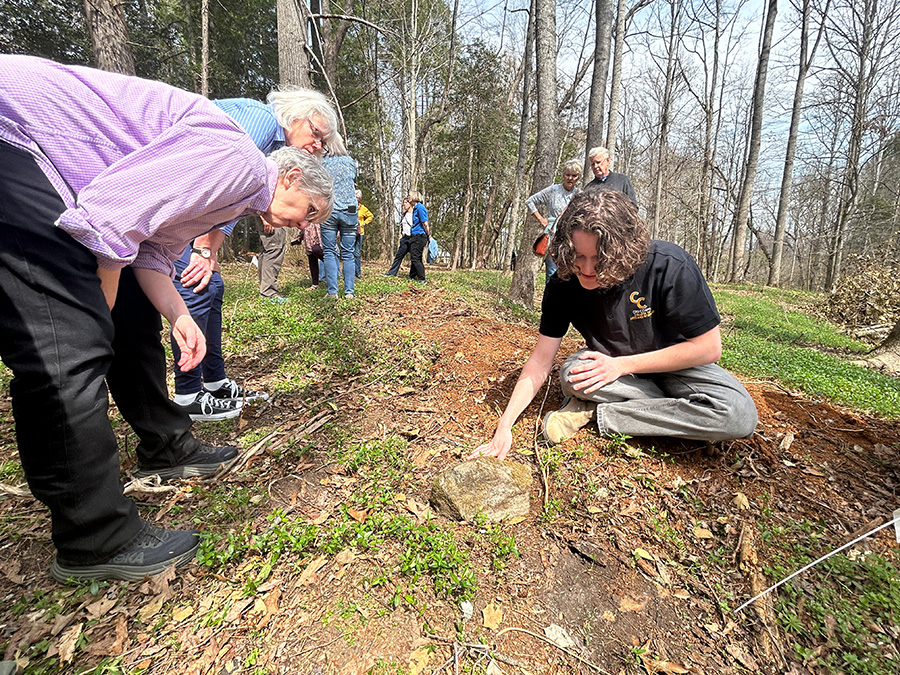
App State alumnus Tucker Terrell ’25, who graduated from App State in May with a bachelor’s degree in geology-environmental geology, in foreground, explains how faint engravings on a stone indicate it was a headstone for enslaved people at Fort Defiance in Caldwell County. The marker was retrieved from beneath a log by researchers working the site in recent months. Photo by Bret Yager
Dr. Andrea Burns, associate professor in the Department of History and director of App State’s applied and public history graduate program, led a graduate class in fall 2024 that used the products of McKesson’s spring 2024 class, “Antebellum Slavery in Appalachia,” as a foundation to create curriculum for public school educators, fort staff and volunteers. The inspiration for the exhibit also sprang from McKesson’s class, offered through the Department of Interdisciplinary Studies. Dr. Beth Davison, a professor of sociology in the department, assisted with the class and planning for the exhibit, and spearheaded fundraising and promotion efforts.
“The idea for Israel’s paintings came out of the class when I realized that I had ancestors who were enslaved there,” McKesson recalled. “Israel is my first cousin once removed, and I’ve always followed his work. The idea of having him interpret the experiences of our ancestors and others who were enslaved there came up one day as I was talking to Beth Davison about the overall class project and what we could do with the summer kitchen as a permanent exhibit space. I mentioned that I’d love to see his talent incorporated there to honor our ancestors and demonstrate how much they and their descendants continue to contribute to history and society.”
Cowan plans to work in cooperation with the Fort Defiance directors to have the cemetery recorded by the state of North Carolina as an official burial ground. The boundaries will be delineated and the site commemorated in some fashion, depending on what the board decides. More attention will go to the fort site, buried in the sod, its location undetermined until recently. Cowan intends to seek funding to bring in an archeologist from App State to excavate the area.
“As soon as we get funding, we’d like to dig the fort up,” she said.
The grave sites are located away from the fort’s footprint and will be left untouched.
“I think it’s important to tell the whole story,” Cowan reflected. “When groups come here, they will not be able to overlook the accomplishments of the enslaved in making this a successful plantation.”
What do you think?
Share your feedback on this story.
About the College of Arts and Sciences
The College of Arts and Sciences (CAS) at Appalachian State University is home to 17 academic departments, two centers and one residential college. These units span the humanities and the social, mathematical and natural sciences. CAS aims to develop a distinctive identity built upon our university's strengths, traditions and locations. The college’s values lie not only in service to the university and local community, but through inspiring, training, educating and sustaining the development of its students as global citizens. More than 6,800 student majors are enrolled in the college. As the college is also largely responsible for implementing App State’s general education curriculum, it is heavily involved in the education of all students at the university, including those pursuing majors in other colleges. Learn more at https://cas.appstate.edu.
About Appalachian State University
As a premier public institution, Appalachian State University prepares students to lead purposeful lives. App State is one of 17 campuses in the University of North Carolina System, with a national reputation for innovative teaching and opening access to a high-quality, cost-effective education. The university enrolls more than 21,000 students, has a low student-to-faculty ratio and offers more than 150 undergraduate and 80 graduate majors at its Boone and Hickory campuses and through App State Online. Learn more at https://www.appstate.edu.












